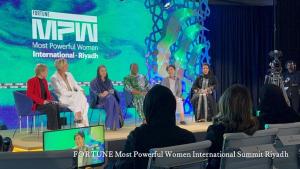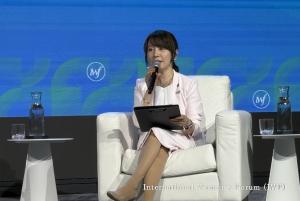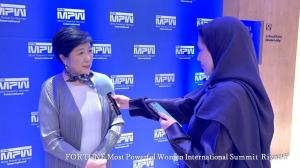TOKYO, JAPAN, August 25, 2025 /EINPresswire.com/ -- Tokyo Governor Koike Yuriko has told a global gathering of female leaders that it has taken “passion” to serve at the helm of the vibrant capital city for nearly nine years—marked by her drive to empower women and ensure welfare for children.
Ms. Koike, first elected in 2016 as Tokyo’s first-ever female governor, and her female deputy, Vice Governor Matsumoto Akiko, were recently invited to speak at separate high-profile international women’s conferences.
They spelled out Tokyo’s efforts to advance women’s leadership and spread this movement of empowerment across Japan. Although female Tokyo citizens’ share of managerial positions in the workplace remains limited, their status is improving in various fields, the city executives said.
At a panel discussion on May 21 at the “Most Powerful Women” international summit organized by the U.S. business magazine Fortune in Riyadh, Saudi Arabia, Ms. Koike was asked about a skill that has made her successful as the governor of Tokyo.
“First of all, passion,” Ms. Koike replied. “And a concrete blueprint to how to make people be happy or happier. And also, the skill to get the empathy from my people,” she added. “This is very important.”
At the panel themed “Women in Public Service,” she also expanded on her priority agenda. That is to help “women’s dreams come true” and ensure “children are carefree” with free school lunches and tuition, and other support measures, she said.
Tapping the ‘Power of Underutilized Women’ to Change Society
Ms. Matsumoto, appointed last October as Tokyo’s first female vice governor in five years, attended an annual conference of the U.S.-based non-profit foundation International Women’s Forum (IWF) on May 22 in the U.S. city of Seattle.
About gender equality and inclusive society, she said: “A society where it is easy for women to succeed is also a society where everyone, regardless of gender, can work comfortably and lead to growth for all.”
Ms. Matsumoto was speaking at a main session themed “What Creates a Thriving Economy.” The IWF connects more than 8,000 female leaders in 35 countries with the aim of advancing women’s leadership.
As one of the four vice governors of the megalopolis with 14 million residents, Ms. Matsumoto has built her career in various bureaus at the metropolitan government, focusing on women’s empowerment in recent years.
She noted that women, who make up about half of Tokyo’s workforce, account for only 20% of decision-makers. “The power of women, who have been underutilized,” is central to “driving change in a society,” she said.
Ms. Matsumoto added, however, the status of women in public and political fields has improved in Tokyo. The ratio of women on the metropolitan government advisory boards rose from less than 30% in 2016 to about 50% in 2024 after Governor Koike enforced a quota system, she said.
According to Ms. Matsumoto, initiatives by the Tokyo Metropolitan Government (TMG) promoting women in business include:
- The TMG has been actively promoting a network to help develop female business managers. The network currently involves more than 100 companies including one of Japan’s top three banks and largest railway company.
- It has helped 280 female entrepreneurs develop their businesses in Japan and worldwide. The number of female business owners in Tokyo has increased from 105,000 in 2018 to 165,000 in 2024.
- It established a public-private fund in March to raise more than 55 million dollars for startup companies that provide services supporting female entrepreneurs and businesses.
A Driving Force Behind Creating an Inclusive Society
Ms. Koike and Ms. Matsumoto may be a driving force behind making Japan a more inclusive society.
Of Japan’s 47 prefectures—equivalent to states or provinces in other countries—only two are headed by women including Ms. Koike, according to the national government’s Cabinet Office. Among the chiefs of the country’s 1,741 municipalities (cities, towns, villages, etc.), women accounted for 4.0% as of June.
Ms. Koike, a former member of parliament, has a long track record in breaking the “glass ceiling.” She served as Japan’s first female defense chief in 2007 after heading the environmental ministry 2003-2006.
At the Fortune panel, she said it is a common urban agenda to satisfy people’s needs in areas such as education, child-rearing and industrial and economic revitalization. However, Ms. Koike added that, as Tokyo’s first female chief executive, she puts women and children high on her agenda.
Governor Koike is known to have led “seamless measures” to encourage courtship, marriage, childbirth and parenting to reverse the declining birthrate, one of the most pressing global urban issues. Some of the women empowerment and child support initiatives are already in progress.
The Tokyo Metropolitan Government has been providing subsidies to children aged between 0 and 18, free tuition to public high school students and free lunches at public elementary and secondary schools. It has also started financial assistance to women who want to freeze their eggs to postpone pregnancy until they feel ready for childbirth and child-rearing. Last September, it also released an AI-powered match-making app.
Ms. Koike has introduced a four-day work week this year, primarily aimed at balancing women’s work and life often burdened with commitments such as child-rearing and caregiving.
Tokyo Has Its Own ‘2050 Strategy’
It was the third trip to Saudi Arabia for Ms. Koike, who studied at Cairo University in her youth, and she praised a “big significant change” since her last visit there in 2016. “The women are driving cars,” she noted at the Riyadh panel, pointing to the 2018 rule change under King Salman’s order.
The Tokyo governor spoke highly of Saudi Arabia’s national project Vision 2030 which, she said, “transformed the country (and made it) comfortable for everyone, male or female…and children, and for the handicapped.” Ms. Koike added that “the needs of people, the needs of citizens, are the same" in a "megacity like Tokyo" or in a small village.
Saudi Vision 2030 was launched in 2016 under the leadership of Saudi royalty to diversify the oil-rich kingdom’s economy, empower its nationals, create a vibrant investment environment and establish Saudi Arabia as a global leader.
Ms. Koike has her own grand plan, “Tokyo 2050 Strategy,” which she unveiled earlier this year as policy targets. One of its goals is to make Tokyo the “best city in the world” that strikes a balance between “growth” and “maturity.”
Her administration also aims to create a technology-driven sustainable future by nurturing startups, boost international tourism with an “old-meets-new” mix of rich traditional culture and modern innovation, and build its resilience against severe floods and storms, earthquakes and infectious diseases.
‘Women in Action’ (WA): A Circle Spreading from Tokyo
At the Fortune panel in Riyadh, speakers were asked to present a “bold idea” concerning public leadership. Ms. Koike recalled there were only 36 female mayors and governors in Japan when she helped organize their network a few years after taking office. The number has topped 70.
Her bold idea is to encourage women not to hesitate or waste time in running for public office. “The world is so changeable and turbulent, and this is a chance for women,” she said. “So, let us challenge (ourselves).”
Other speakers on the panel were:
- Hanan Abdulraheem Alahmadi, assistant speaker of Saudi Arabia’s state advisory body Shura Council
- Obiageli Ezekwesili, Nigeria’s former Minister of Education
- Farah Ismail, Deputy Minister in Saudi Arabia’s Ministry of Economy and Planning
- Silvana Koch-Mehrin, former Vice President of the European Parliament, who leads the non-profit foundation Women Political Leaders.
Tokyo’s various women’s empowerment initiatives have been integrated into an overarching project, dubbed “Women in Action (WA),” connecting business owners, entrepreneurs, municipal leaders and other influential people through various forums and training program. “WA” could mean “circle” or “harmony” in Japanese.
“We aim to expand the circle of women’s empowerment (WA) across Japan,” Governor Koike said in a message on the March 8 International Women’s Day. “Let’s work together to create a more harmonious society that allows everyone to play active roles for a brighter future.”
Speaking in Seattle, Vice Governor Matsumoto was also upbeat about the Women in Action project. “From Tokyo, we aim to start a movement to empower women and spread it all over Japan,” she said, “and also to work together with people around the world to promote this movement.”
Governor Koike spent the last day of her two-day stay in the Saudi capital visiting the Misk Foundation, a non-profit Saudi organization fostering youth education, leadership, creativity, and entrepreneurship. She also exchanged views with Riyadh Region Governor Prince Faisal bin Bandar bin Abdulaziz at his office.
Riyadh was the destination for Ms. Koike’s 22nd official overseas trip as Governor of Tokyo, and the fourth since her re-election to a third term in July last year. She has been to Cairo/Abu Dhabi/Baku, Bangkok and Paris earlier in her ninth year in office.
“We had very lively discussions with female leaders from around the world including those from Saudi Arabia, which is now putting much effort into women’s empowerment,” Ms. Koike told reporters on her return from Riyadh.
“Saudi Arabia has long had a very conservative image. But I was much interested to learn that the country has made a big step forward,” she said. “I want to follow its example in creating an environment in our country and Tokyo to help women better attain self-fulfillment.”
Strategic PR Section, Strategic PR Division
TOKYO METROPOLITAN GOVERNMENT
364271627398
email us here
Legal Disclaimer:
EIN Presswire provides this news content "as is" without warranty of any kind. We do not accept any responsibility or liability for the accuracy, content, images, videos, licenses, completeness, legality, or reliability of the information contained in this article. If you have any complaints or copyright issues related to this article, kindly contact the author above.







